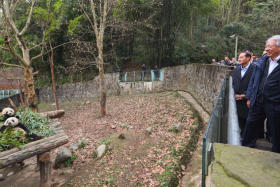Public sector to lead green push and save $62.5m a year
Singapore's biggest employer plans to slash its consumption of electricity and water as part of a nationwide "go green" plan unveiled yesterday.
By 2020, the public sector will use 15 per cent less electricity and 5 per cent less water compared with 2013 levels, according to the Public Sector Sustainability Plan 2017-2020 announced by Deputy Prime Minister Teo Chee Hean.
The temperature setting for thermostats in air-conditioned public-sector offices will be set higher, Mr Teo said.
Such steps could save $62.5 million a year, apart from being gentler on the environment.
For a start, premises will be greener. All new public-sector buildings will attain the highest Green Mark Platinum standard and existing buildings will aim for at least the Green Mark Gold standard for environmentally-friendly buildings.
Events and functions will be held in venues with at least a Green Mark Certified rating - the basic certification grade.
The public sector will also buy more green electronics and paper products for its offices.
Food waste will be recycled in public-sector premises and a floating solar test-bed will be set up in Tengeh Reservoir, in Tuas.
The sector will also continue to invest in green technologies and seek innovative ways to harness renewable energy.
'TRANSFORM'
"This will help transform the way the public sector operates and set an example for the wider community to adopt sustainability as our way of life," added Mr Teo, the Coordinating Minister for National Security.
The public sector is Singapore's largest employer, comprising 16 ministries and 64 statutory boards, and about 145,000 officers.
From 2013 to 2015, the sector accounted for an average of 4 per cent of Singapore's total electricity consumption and 3 per cent of total water consumption.
Under the 2016 Paris Agreement, Singapore has committed to reduce emissions intensity by 36 per cent from 2005 levels by 2030.
Get The New Paper on your phone with the free TNP app. Download from the Apple App Store or Google Play Store now



